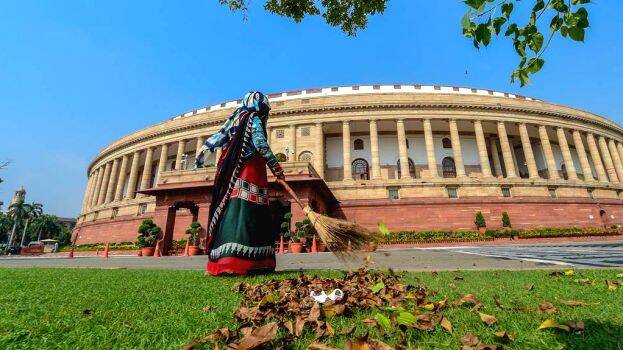

The monsoon session of Parliament had to be ended eight days before the scheduled date of wind-up. The official explanation is that the session had to be cut short as many MPs including ministers were down with Covid.
But the truth is that the Opposition parties were on a war path against the government over controversial laws and their making.
On September 22, the Opposition boycotted the ongoing session over Centre’s refusal to accept its demand for withdrawal of farm bills passed by Parliament.
On September 20, the Rajya Sabha passed two contentious key farm bills - Farmer’s Produce Trade and Commerce (Promotion and Facilitation) Bill, 2020, and the Farmers (Empowerment and Protection) Agreement of Price Assurance and Farm Services Bill, 2020) through voice vote.
On September 23, the MPs of the Opposition parties which boycotted Parliament met at the chamber of Ghulam Nabi Azad, Leader of Opposition in the House.
Following the ruckus in the Upper House on September 23, eight Opposition MPs, including Trinamool Congress floor leader Derek O’Brien and AAP’s Sanjay Singh, were suspended from Rajya Sabha for a week under Rule 256(2) on Monday.
Rajya Sabha deputy chairman Harivansh Narayan Singh who was at the chair when the Opposition MPs created a furore inside the Rajya Sabha observed a one-day fast protesting the unruly behaviour of the Opposition MPs.
The two farm bills are presently awaiting President’s nod.
The bill met with opposition in both houses but it sailed though in Parliament but this was not the case in Rajya Sabba. There was turmoil before voting for the bill
Many things that should not have happened, happened. People saw what some of the members did to the chairman of Rajya Sabha. Though people have become sensitised to this, it exceeded limits
But, despite the humiliating show by the Opposition parties, the bill sailed through in Rajya Sabha as well.
In protest against the action, the Opposition boycotted both houses for two days. In their absence, the Central government easily passed about 15 bills.
The monsoon session gave the nod for many important bills including three farm bills and the bills related to the reformation of labour laws. Most of them required a comprehensive discussion, debates and opinion formation. But such things are not happening in houses these days and this may be due to the impact of political opposition and intolerance.
By boycotting houses, what message are those who complained of not allotting them time for discussion, trying to give?
The allegation of the Opposition is that the action was against their protest but this is not the reality. By protesting, the Opposition had lost opportunities for discussing a number of important bills including the labour code bill that affects crores of labourers.
Suspending members for unruly behaviour is not a new thing. Instead of expressing regret, they tried to blow it up for political gains.
Amid the Covid pandemic, the Parliament session was held by the government, spending lakhs of rupees and with proper Covid protocol in place.
The aim was to get MPs engaged in law making even foregoing holidays. It was as part of this that Zero hour was reduced to half. Furore was also created for this. The Opposition boycotted the house when important bills were taken up for discussion. How can anyone accept this anti-democratic move?
By creating ruckus in the houses and holding dharna outside the houses, the Opposition MPs may be able to attract the attention of the public but they are forgetting their responsibility as a people’s representative.
When a Bill, whatever it be, reaches Parliament, people get to know about its benefits and disadvantages through the discussions held in Parliament.
But such procedures are mostly neglected in Law making houses. Opposition parties’ disagreement are often expressed through mayhem and hooliganism.
The situation now is that people will have to resort to other means to know about the good and bad sides of the bill.
On the other hand, the government who brings in a new bill is only concerned about passing the bill and they don’t want the people to know about it.